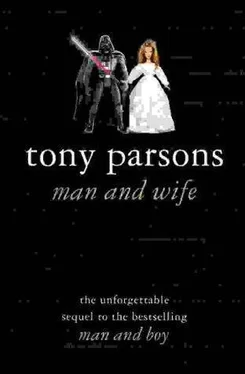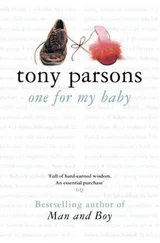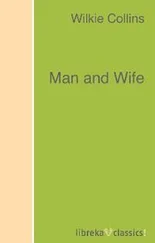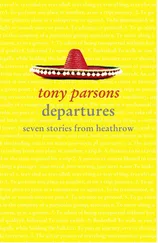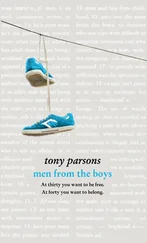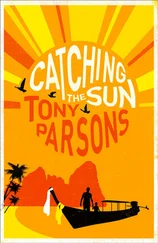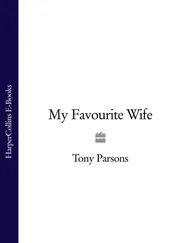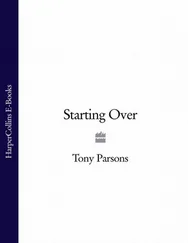And there were still many things she would not talk to me about, things that I had to guess at, to wheedle out of surgeons and her female friends and all those pink and purple leaflets. What my mum would call – women things.
She still couldn’t wear a bra because of the scar, because it was still so raw and sore. This seemed insultingly cruel. Again I was reminded that this cancer seemed sadistically committed to making my mum feel like less of a woman than she was before.
But she dealt with all the indignity, pain and terror without complaint, with the kind of good-natured, mocking pragmatism that she had shown all her life. She went to make more tea, and she smiled at me over Kazumi’s shoulder, raising her eyebrows while giving a little nod. I knew that look. I had seen it when I brought Gina home for the first time. And Cyd, too. That look meant – she’s a smasher.
Kazumi was on the living-room floor with Pat. They had met before, of course, when she took his photograph in Gina’s garden, and I was both happy and worried that my son remembered her so clearly.
Would he mention Kazumi to Gina? Or, worse still, to Cyd? How would I get out of that one? Kazumi was patient and kind, playing with one of his video games, while he regarded her with a kind of delighted curiosity. I feared that my son understood more than I would wish. Not yet eight years old, he was already wise to the ways of the world. Or at least the ways of his old man.
Is this what it would be like for Pat and me at the other end of our lives? In thirty years or so, would I be old and fighting illness, with my son all grown-up and divorced and ready to try again? And when I was fighting for my life, would my adult son still be bringing home some young woman for my approval, acting like he’d never been in love before?
Kazumi was good with Pat. They laughed together, they played together, and although I knew it was unfair to cornpare her to Cyd, who had the permanently thankless role of step-parent, I couldn’t help it. This just felt easier.
Maybe it would have been different if we were living together. No, definitely it would have been different. But as Kazumi and Pat played Nuke Universe Two I dreamed of running off with the pair of them. To Paris or County Kerry or anywhere far from here. I looked at my son with Kazumi and I believed that it was not too late to start again. And as I thought of the infinite kindness in my mother’s face, I also desperately wanted to travel with her, to see some other things while we still could and before it was too late. I wanted to get us all away from this place.
My mum returned with tea and biscuits and I showed her the brochures that I had brought with me. She handled them carefully, as if she had to give them back to their rightful owner.
’Nashville, Mum. The home of country. Listen to this, Mum. We can go together. Pat, too. In one of the holidays. Kazumi, if she’s not busy with her work. A real holiday for you. Listen, Mum: Six million people a year travel to Nashville, Tennessee, the home of country music. Enjoy the rhinestone glitter of the Grand Ole Opry, Music Row and the Country Music Hall of Fame. Experience the Nashville Sound of Hank Williams, Patsy dim, Jim Reeves, Kenny Rogers and Shania Twain. Sounds great, doesn’t it? Mum?’
But my mum was different from me. She didn’t dream of escape. She wanted to stay here.
’Sounds lovely, darling, but I’m happy in my own home.’
She put the brochure down. And I saw that my mum was never going to make it to Nashville. This is where we were so different. Unlike me, my mother didn’t believe that happiness was always somewhere else.
’I like holidays,’ she said to Kazumi. ’My husband and I, we used to go somewhere every year. Cornwall and Dorset when Harry was young. We even went to Norway a few times – I’ve got a brother who settled there after the war, met a lovely girl. I had six brothers, did Harry tell you that?’
Kazumi made suitably impressed noises. She was getting the hang of this very quickly.
Then Spain later, when Harry didn’t want to come with us any more,’ continued my mum. ’But I like it here. Do you know what I mean? I like that feeling you get, that feeling you don’t get on holiday, when you’re away from everything familiar. You know, that feeling you get when you’re part of a family.’
Then my mum looked at her hands, as if admiring her bright-red nail polish, or searching for signs of lymphoedema, or maybe just looking at her wedding ring, a modest band of burnished gold that somehow contained an entire world.
You never saw anyone so happy to be having a baby.
When I came back from running in the park, she was on the stairs, laughing and crying at the same time.
’ I’mpregnant ,’ she said, like it was the best thing in the world. Then she was in my arms and later, when we had untangled our limbs, and stared at each other, laughing out loud, unable to believe our luck, after all of that she showed me the blue line on the pregnancy test – that thin, blue, indisputable line.
And in the days and weeks ahead, she kept taking more pregnancy tests, looking for that blue line again and again, as if it was too good to be true. Maybe there are other pregnant women whose favourite pastime is taking pregnancy tests, even though they already know the answer, even though they have already had the happy result confirmed dozens of times.
But Gina was the first woman that I ever really knew.
The first woman I lived with, the first woman I married. She found a source of endless wonder in her daily pregnancy tests, and I found a source of wonder in her.
That was almost nine years ago now. The world turned, and kept turning, and not only was my wife now my ex-wife, but she was about to become the ex-wife of another man. They talk about the divorce statistics, and the fluctuating failure rate of the modern marriage, but for my ex-wife and me the rate seemed to be 100 per cent.
That thin blue line represented a little heartbeat inside her, and that glimmer of life was now a boy, almost eight years old, changing every week, growing teeth that would have to last him until his dying day, and this life he was leading – bouncing from one home to another, one school to another, one country to another, seeing marriages crumble, learning that the adult world was fragile and weak and fallible – seemed to be robbing him of his – well, I don’t know what you would call it.
Robbing him of his halo of innocence. The aura of light that was all around him as a little boy, the light that made strangers stop and smile at him in the street.
Pat is still a boy in a million. He still shines. To me he still looks like the most beautiful child in the world. But this life has robbed him of that angel glow. It has gone, and it will never come back, and while it is possible that we all lose that angel glow in the end, I can’t help feeling that Gina and I who held that very first pregnancy test as if it was as precious as our baby himself – share most of the blame. We could have done better for our boy. But Gina’s mood was such that right now she blamed her latest ex-husband for everything.
’Easter, right? Shouldn’t be a problem, should it? You would think that Easter doesn’t present too many possibilities for domestic strife.’
We were in the tiny kitchen of her flat, drinking some jasmine tea. This love of Japan, this yearning for the life she had given up for marriage and me and Pat – she was never going to grow out of it now, she was never going to stop missing that life she had never known.
’But Richard objected to the Easter egg that I bought Pat. Can you believe it?’
Pat appeared in the doorway.
Читать дальше
Конец ознакомительного отрывка
Купить книгу
